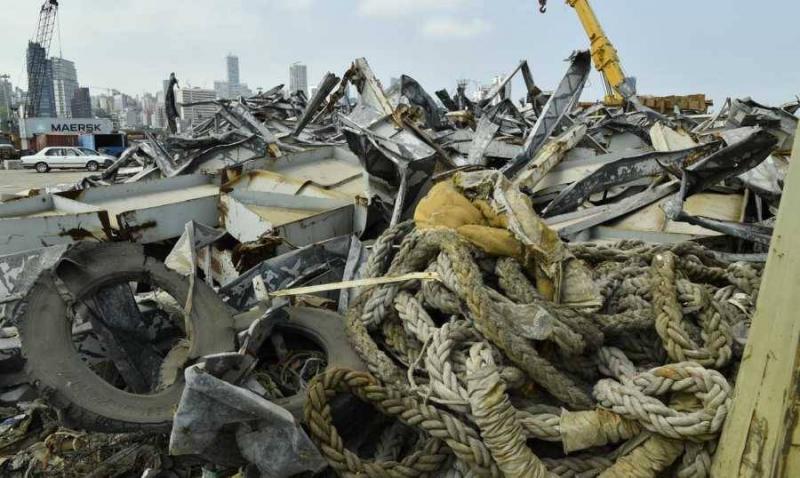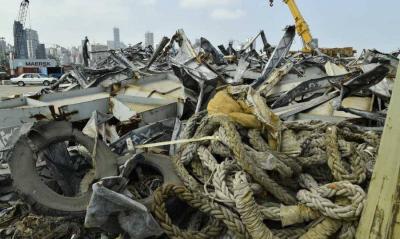The issue goes beyond just the scrap; it connects to something deeper than just iron and the remnants of an explosion. It is the explosion that not only shook the Beirut port four years ago but also led the entire country to the brink. However, despite the fact that the explosion initially meant the loss of lives, injuries, and missing persons, as well as material damages—which necessitates uncovering the truth about the perpetrators and holding them accountable—the four years that have passed have not only carried delays and obstacles in this regard but have also reflected on the metal... and the scrap itself.
While the delay in uncovering the truth is more painful and continues to leave its "scars" on most Lebanese, the delay in selling the iron is reaching its conclusion. Minister of Public Works Ali Hamieh announced that next week the sale process for scrap will begin after completing the bidding process.
Can we talk about "technical delay" in launching this operation? What has been the journey of the bidding process over the past four years?
#### "Natural Deadlines"
"Things proceeded according to the rules, under the supervision of the Public Procurement Authority," answers Jean Aliye, head of the Public Procurement Authority, to "An-Nahar," confirming that there cannot be talk of "delay" in the true sense of the word. He explains: "This matter takes time, and we can say that things have progressed according to deadlines related to similar files. Cooperation was carried out by the Beirut port management, with oversight from the Public Procurement Authority."
Thus, Aliye reassures that things progressed according to the required scientific-technical path. He comments: "The important thing is that the bidding was conducted according to applicable Lebanese laws, foremost among them the public procurement laws."
Next week, the sale of scrap, iron, and debris left by that fateful explosion is expected to begin, excluding the cars, as another file related specifically to the cars is anticipated to commence soon, through another public bidding concerning the sale of port car scrap, which amounts to about 1,100 vehicles destroyed by the explosion, according to the Minister of Public Works.
It is known that the public bidding, which was conducted through the Public Procurement Authority, was awarded to a consortium of Concorde and Sultan companies. One of the crucial points in this file is that the concerned company scored the highest marks in the technical-scientific evaluation and the lowest in the financial evaluation.
According to information announced by Hamieh during his recent press conference announcing the bidding process, "the value of the bid submitted by the two winning companies amounted to $245 per ton, based on 28,000 tons of various scrap that will be removed from the port’s premises," with the operation expected to take around 75 working days.
#### Process Journey
This journey, which is supposed to start next week, has seen a series of tenders or bids that did not come to light on previously set dates, causing delays about four times. According to "An-Nahar," the Management and Investment of the Port of Beirut had previously announced that the bidding for the sale of the metals and scrap left by the August 4, 2020, explosion could start in December 2023. However, the fluctuating political situation at that time, followed by the security situation brought about by events in the south, delayed the file, particularly regarding any bidding company wishing to enter the auction.
On August 30, 2023, a bidding was launched, and the initial date for opening offers was set for October 3, 2023. During this time, the terms of reference underwent some amendments or additions, whether from the port management or bidding companies, which slightly delayed the process.
Apart from the political-security aspect, which played a significant role in determining the bidding launch date, there is a technical factor that is no less important, as it relates necessarily to the conditions of any bidding that may take place. This involves ensuring that the collected scrap and metals are free from any radioactive materials, which led to continuous tests carried out by the National Authority for Nuclear Energy established by the National Council for Scientific Research. After announcing results that were "satisfactory" or reassuring in this regard, the bidding process took its natural course until the official announcement two days ago.
All this process confirms that Aliye asserts it "came within the natural context of deadlines, and the most important thing about the time spent on the file is its compliance with the legal aspect and public procurement regulations." Thus, the explosion of August 4 turned the Beirut port into "scrap and iron for sale," but what lies beyond the iron and materials is more crucial. What about the "human remnants" of that explosion that still pain the families and have yet to lead them to the truth, as we approach the fourth anniversary of that "quake" whose aftershocks still weigh heavily on the souls? According to "An-Nahar."




